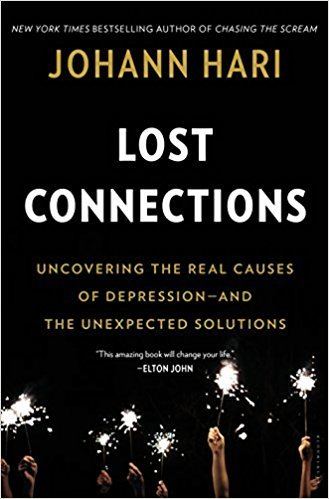It’s capitalism that creates the need for so many antidepressants. Credit: Joe Raedle/Getty Images

We are a nation hooked on happy pills was the way the Daily Mail reported it recently. According to the OECD, prescription rates of antidepressants in the UK have trebled in the last 15 years. And we take twice as many antidepressants as they do in France and Italy and the Netherlands. But if you raise the question of why, or wonder if there is something concerning behind these figures, you will readily be accused of what is called ‘pill shaming’. Its one of those all-purpose Twitter insults that is employed to stop any kind of conversation about our use of anti-depressants and their effectiveness.
 Which is why you have to admire the courage of Johann Hari, who has knowingly walked right into the lion’s den with a new book, Lost Connections, on “the real causes of depression – and the unexpected solutions”, in which the unexpected solutions are more social than pharmaceutical. Hari has been no stranger to depression himself, nor to the drugs that are typically used to treat it. And while the anti-depressants that he took often had some short-term effect, what he began to notice was that, within a year or so, he was always back where he started.
Which is why you have to admire the courage of Johann Hari, who has knowingly walked right into the lion’s den with a new book, Lost Connections, on “the real causes of depression – and the unexpected solutions”, in which the unexpected solutions are more social than pharmaceutical. Hari has been no stranger to depression himself, nor to the drugs that are typically used to treat it. And while the anti-depressants that he took often had some short-term effect, what he began to notice was that, within a year or so, he was always back where he started.
The problem that people have in seeing though this common pattern, Hari explains, is that they are generally extremely committed to the story they have come to accept about their own pain. And, as a consequence, they are often highly threatened by any attempt to change the story. Hence all the accusations of ‘pill shaming’.
Back in 2011, when he was calling for the Pope to be arrested, Hari used to irritate me no end. Rightly or wrongly, I used to think that he was just another of those tiresome New Atheists, using his considerable critical skills to bash an easy target. The case against God is hardly difficult to make and it risks so little for a public intellectual to make it. But on his return from a time in the wilderness, Hari has started to take on some much more powerful gods, ones that are often and uncritically worshipped in our society. He is still intent on putting all forms of magic to the sword – and I’m sure his atheism is undimmed – but this time he is after the magic being sold by people in white lab coats and backed up by sales teams from pharmaceutical companies. This is the new version of organised religion. And those, like Hari, who have apostatised from a once-held faith in salvation by chemistry will be ferociously attacked. That’s what happens to apostates. I suspect Hari knew this and did it anyway. Respect.
The point about magic is that it is the promise of a short cut – to power, wealth or happiness. There is a shop in Brixton market where you can buy all sorts of potions to solve your love life or bring you success in business. Happy pills are not all that different. Both require belief – or, as scientists call it, the placebo effect.

At least, that is how they work much of the time, as Hari argues. Both promise an easy, pain-free, route to happiness; one that doesn’t require the sort of emotional hard work that might be required to fix your relationships or to mourn a loved one or to care more for your neighbours. For some people antidepressants do make a real and important difference. And when it comes to the misery of depression, anything that helps is to be welcomed. But there never will be a chemical fix for the misery of a highly individualised society or a community that had lost any sort of connection with itself.
The way I see things, the route cause of this rising epidemic of depression has little to do with serotonin and more to do with capitalism. Capitalism is the illness from which we are suffering. It tears people from their roots as they are forced to leave their home or even their country to find work; it breaks apart communities, sets people against each other, creates chronic insecurity, and infects our brains with the wickedness of total-immersion advertising that makes us continually want things that cannot ever satisfy us.
So we spend our money on things we don’t really want with money we don’t have, and get trapped on a treadmill of debt. “Just like junk food has made us sick, junk values have made us mentally sick. We have been fed KFC for the soul,” says Hari. And he is right.
I often have two books on the go at the same time. And Lost Connections has been sharing my bedside table with Pankaj Mishra’s brilliant Age of Anger, a philosophical tome that charts the long history of the frustrations of those who have been left behind, alienated and forgotten. Mishra doesn’t go into the psychological impact that all this anger has on our inner lives and happiness, but there is no doubt that it has to be considerable.
Read together, the two books left me with a terribly dystopian vision in which we have set up a society that economically works for the benefit of the so-called 1%, and which increasingly medicates society’s losers so as to keep them from asking the sort of questions that might challenge this whole structure of misery. The political questions that are raised here – from globalisation to the resentments that bubble to the surface on social media – all go far beyond the reach of the next prescription.
Which is why the accusation of ‘pill shaming’ is so profoundly reactionary: it blames those who want to challenge this whole edifice of human misery for pointing out the foolishness of using pills to provide any sort of answer to something so colossal, and thus it protects injustice from any form of political or spiritual redress.
The shouty accusation of pill shaming typically comes from those who are too afraid to see that the story of their own oppression is political not pharmacological. And many are too afraid of this conclusion because it might require something more of them than swallowing a few pills. “Go the bloody hard way,” advised Wittgenstein to his pupils. Unfortunately, it is always easier to believe in magic.










Join the discussion
Join like minded readers that support our journalism by becoming a paid subscriber
To join the discussion in the comments, become a paid subscriber.
Join like minded readers that support our journalism, read unlimited articles and enjoy other subscriber-only benefits.
Subscribe